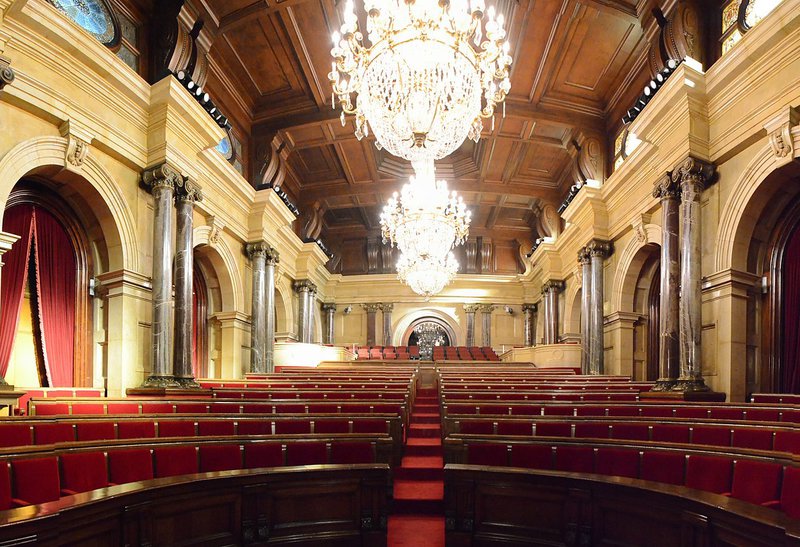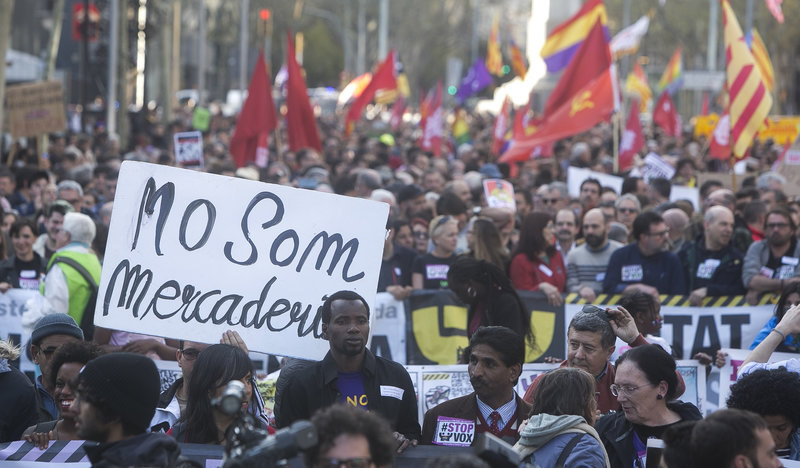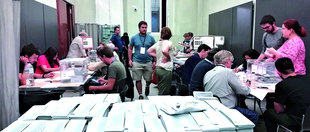A viral campaign
Catalonia’s political parties find themselves facing an unusual campaign in which they must use new avenues to reach voters after the courts ruled the election will take place on February 14
It is a truly Kafkaesque scenario: the election campaign in Catalonia began even though it was not known until hours after it started that the vote to elect a new parliament will finally be held on Sunday February 14. The Superior Court of Justice of Catalonia (TSJC), the self-proclaimed arbiter in the battle to postpone the election because of the health crisis, made its ruling more than a week before the February 8 deadline it had set to make a final decision.
In fact, the political parties began the campaign as if even a judicial earthquake would not have the magnitude needed to stop the election from going ahead. Several polls indicate that the ERC and PSC parties are the ones vying for victory, with the JuntsXCat party hard on their heels. The independence movement aspires to retain its majority in parliament and, this time, to do so with a minimum of 50% of the vote. For the time being, the campaign has adapted to the health situation and in this atypical election campaign even the movement’s political prisoners will play a prominent role.
Little about this election will be normal, not least the campaign itself. Parties will have to keep physical contact with people to a bare minimum and divert a lot of their efforts into the media and social media. They will also have to attract an audience to their telematic events that is beginning to feel the strain of connecting to the world via a mobile phone or a computer screen. Face-to-face events and rallies will take place, but most parties recommend people do not leave their municipality and only attend events held close to home.
Teresa Baró is an expert consultant in personal communication skills, and especially in non-verbal language. She believes that in this campaign candidates “must think even more carefully than usual about what image they want to put over and to understand that the whole body conveys a message.” Without face-to-face events, or with this format very limited by the pandemic, “parties will have to take great care over the production of the images, what photos and videos are posted on social media, for example.” In addition, at a time when masks hide facial expressions, Baró prescribes them taking special care with their clothing and even the message that choosing one mask over another might imply. She also recommends finding formulas to replace the smile, through using the eyes and the movement of hands and arms.
“It’s also advisable for the press and public relations team to pursue that angle in the photographs that shows the candidates as close as possible to the public, while always respecting the health measures, in order to transmit the message that the party is close to the people,” says the expert. She also thinks it necessary to disseminate previously recorded images, in suitable spaces, in which the politician appears without a mask and can be seen in a kinder, smiling pose.”
More than ever, says Baró, politicians should remember that “the whole body speaks: in the position of their head, how they walk, whether or not they wrinkle their forehead...” As for the message, she says that the best thing “is to offer a structured, brief and attractive speech that provides solutions and can be seen in a positive tone.”
Combatting abstention
One thing that worries the authorities and the political parties is the apparent difficulty in getting their voters out of their houses to vote. In the coming days, increasing efforts will be made to reassure the public that going to the polls is quite safe as the parties do their best to prevent an increase in abstentions.
“We have two indicators that suggest there may be an increase in abstention,” says political scientist, Gemma Ubasart. “The latest CIS poll tells us that four out of ten voters have not decided whether they will vote and that only 67% are sure that they will go to the polls, a figure that tends to be inflated. Therefore, these are two elements that indicate to us that the public is not very mobilised,” she says.
Speculating about what could happen on February 14 is made more difficult because “there is no comparable scenario.” When voting was held in the Basque Country and Galicia, the pandemic was still not in full swing or the intensive care units of hospitals saturated as they are now. Yet, Ubasart thinks that fewer people will go to the polls than on previous occasions: “The elections in 2015 and in 2017 took place when the independence issue led to record and unusual turnout figures,” she adds.
Returning to the CIS poll, the political scientist points out that those who say they have no intention of going to vote affects all age groups equally, which if true “makes it very difficult to predict which parties will be harmed more if participation goes down.” “If the elderly are the ones who do not vote, the Socialists may be among those most affected,” she adds.
Manning polling stations
Before the appointed day arrives, the authorities still have certain issues on the table that could cause them a headache. If one of the biggest challenges is convincing everyone that the election is safe, the same goes for the people who have been chosen by lottery to staff the 2,764 polling stations around the country.
The first difficulty is to find enough people, as it seems that the percentage of citizens who allege a reason for being exempt has skyrocketed. What has also gone up is the number of people who are supposedly not at home to collect their citation.
At the same time, the Catalan executive has announced that 60,000 antigen tests will be carried out on the people manning the polling stations a few days before election day. They will be voluntary and will be carried out at primary care centres (CAPs) through an appointment system. They will also be provided with FFP2 protective masks to ensure maximum protection all day instead of the surgical masks initially planned and will be given personal protective equipment (PPE) which must be put on and then removed before and after the last voting slot, from seven to eight in the evening, which is intended for people in isolation and those in contact with them.
feature politics
Prisoners on campaign
The Catalan government’s justice department has once again awarded the third degree prison regime to the nine pro-independence leaders who are serving sentences for their part in the 2017 referendum. The new prison regime means that the prisoners will only have to go to their prisons from Monday to Thursday to spend the night. This regime of semi-liberty also allows the prisoners to participate in the election campaign. Their presence at the party events will be one of the highlights of the campaign. The third degree prison regime comes now they have served a quarter of their sentences, something that gives them hope that the courts will not overturn the decision.
No vote, no voice
Universal suffrage is not so universal. In Catalonia, some 15% of the population over the age of 18 cannot vote because they do not have Spanish nationality. Others, such as Catalans living abroad, can vote but doing so is no easy matter
Everyone having the right to vote makes democracy what it is. In practice, however, universal suffrage in Catalonia and in Spain has limits. The most egregious is denying the vote to foreign residents, while the existence of complex obstacles and a lack of interest in solving them makes voting from abroad problematic. And then there are other issues, which are just beginning to be resolved or debated, such as the vote of people with intellectual disabilities or giving the vote of 16--year-olds.
“When it comes to universal suffrage, the first question we should ask ourselves is: universal for whom?” asks Paula Rossi, from SOS Racisme. She is Argentinian and has lived in Catalonia for five years, where she participates in various citizen groups. She is integrated into Catalan society, pays her taxes, and fulfills the same obligations as any other citizen. But as she does not have Spanish nationality, she cannot vote. “Suffrage is only universal for those who are considered entitled to it. Migrants, because of who they are, are discounted from the civic life of the country, city, community... And not only migrants, but also the children of foreigners who were born here but do not have Spanish nationality,” she explains, pointing out that in Spain nationality – and therefore citizenship – is not acquired by birthplace but by blood. Thus, the children of migrants, even if born and living here, must apply to be Spanish citizens to get the vote – a complicated process can take many years to complete, by which time a number of elections may have gone by. This produces a hypocritical paradox: while institutions campaign against racism, denying the right to vote is one of the most obvious and visible examples of institutional racism. And it affects a lot of people.
“The state lets you know that you don’t count, that your voice does not deserve to be heard, that you have no right to decide. In Catalonia, over 15% of people can’t vote, but there are some municipalities where the percentage is 30%. Institutional racism appears not only to veto the right to vote, but there are visibly racist town halls in localities where there is a high percentage of people who cannot vote. And this further reinforces racist messages,” she argues. In short, what determines the right to vote is who can be considered a citizen and who cannot. “One of our struggles is to make it so that citizenship is not related to nationality but to residency,” says Rossi.
Votes for all
SOS Racisme is one of more than 70 Catalan organisations that at the end of 2017 launched the ’Vot x Tothom’ (Votes for All) platform, with the aim of vindicating the right of foreigners to vote as an essential condition to consolidating true democracy and a just and egalitarian society. “The lack of a recognised right to vote means that other rights are more likely to be violated,” says Rossi. She points to other signs of institutional racism: the non-regularisation of foreigners, ’buroexclusion’ (exclusion through the bureaucratic system), ethnic profiling by the police... She claims denying the vote is just another element in a system in which the state decides which people are worthwhile and which are not.
In the same vein, the ’Vot x Tothom’ platform warns that the discourse of paternalism has not been overcome, segregating the foreign population and reducing it to a passive object. “This situation of infringing rights has gone on for decades and must be reversed. Foreigners must be recognised as active political subjects and be allowed the tools they need as agents that can transform society,” says the platform’s manifesto.
So far, 14 Catalan city councils have passed motions urging the Spanish and Catalan governments to make the necessary legal changes to extend the right to vote and the right to be a candidate to all people, including foreign residents, in every election. Three of the councils are among the Catalan cities with the most inhabitants: Barcelona, Badalona, and Terrassa.
For now, however, the law is clear: only those who have Spanish nationality can vote, with the exception of local elections, in which the right is extended to all EU citizens and to those of the 12 countries that have reciprocity agreements with Spain: Norway, Ecuador, New Zealand, Bolivia, Colombia, Chile, Peru, Paraguay, Iceland, Cape Verde, Trinidad and Tobago, and South Korea. But linking nationality with voting throws up strange circumstances, such as many Latin Americans who have never stepped foot on Spanish soil having the right to vote because they are descendants of Spanish emigrants who went to America, but who are the least likely to exercise their right.
On the other hand, in the case of migrants, the “justification” often used for not giving them the vote is that they do not understand the reality of the country, even when they have lived here for decades. “We’re not considered educated enough to vote. This is no excuse, especially when it comes to the children of migrants, who were born here and who have lived nowhere else,” says Rossi. She is even more surprised by these blatant inequalities because voting is compulsory in Argentina: “We are very aware that we must be part of the political life of the place where we live, so I don’t understand why I can’t vote here when there are people here who decide not to exercise their right.”
Generous abstainers
Abstention, however, can become an ally of foreign residents to vote through an interesting citizen initiative that has emerged on social media thanks to the children of migrants. In the Spanish parliamentary election in April 2019, Safia Elaaddam, born in Tarragona 25 years ago, posted a photo on Instagram explaining that she could not vote. “There had been an election in which I had not been able to take part and I had this idea in my head for a long time. I explained my case, appealing to other people like me who could not vote to take part,” she says. Her message quickly went viral and she began to receive responses from people who, like her, could not vote – some after decades of residing in Spain – but also from citizens with the right to vote who were not interested in elections and who offered her their vote.
“I thought that if so many people were offering their vote to me, they could offer it to other people in the same situation,” she says. Thus was born the campaign ’Votar és un dret’ (Voting is a Right), to put abstainers in contact with people without Spanish nationality who want to vote. “It has worked in all elections, but the one in which it was most successful was the general election, where 2,000 people were able to vote thanks to the transfer of votes,” she adds. She was even contacted by residents abroad who have the right to vote but are overwhelmed because voting from abroad is so complicated. This, however, is another issue (see pages 24 and 25).
“Our campaign also aims to denounce an injustice. We also have the right to choose who we want to represent us and to be able to respond to the hate speech that is spreading and giving wings to racism,” she says. Clearly, if migrants had the right to vote, parties that use immigration as alarmism in their electoral strategies would have to think twice. “There is so much free use of hate speech because they know we can’t do anything about it. Some parties see that they can use this kind of speech and thus win votes,” adds Elaaddam, who is a social educator and activist in networks like @hijadeinmigrantes.
Rossi thinks that the foreign vote would not have a decisive impact on changing the political scene, except, perhaps, in the municipalities where some places have a higher percentage of immigrants. “Denying the right to vote is a political position. It’s a situation that could be solved very easily,” she remarks. “My participation in this society is limited to paying my taxes and being a ’good migrant’, but I can’t vote, nor can I be voted for. Migrants are relegated to the sidelines, and can never add their own voice,” she insists.
What the parties say
The Spanish right has nothing to say on the issue, and merely insists that immigration must be regulated and, in the case of Vox, it comes with xenophobic messages to capture the racist vote. As for Spain’s ruling Socialist Party, in the general election of November 10, 2019, Pedro Sánchez announced that he would make legal changes to allow foreigners to vote in local elections without the need for any reciprocity agreement. For the moment – and a local election has already taken place – nothing more has been heard about that.
In those elections, the JuntsxCat party included immigration issues in its manifesto but no specific reference to the right of foreign residents to vote. Meanwhile, the ERC party merely put forward a generic proposal to “recognise the right to vote for all citizens.” The En comú Podem party proposed regulating the right to vote through legal means, based on a reform of electoral law as well as a constitutional amendment to allow foreign people with at least one year of residence the right to vote in all elections. For its part, the CUP party has always defended the right of migrants to vote. In fact, the party has even had its members rejected as candidates by the Electoral Board due to them not having Spanish nationality, a circumstance that they have always taken advantage of to denounce the discrimination implied by this situation. In short, as Elaaddam says, “when some people have a right but many others don’t, then that right becomes a privilege.”
feature politics
feature politics







